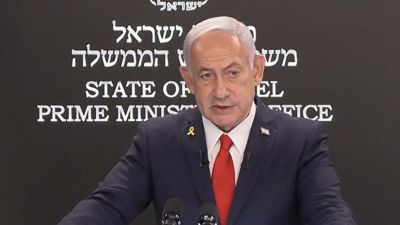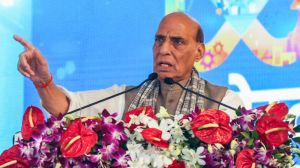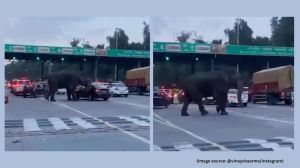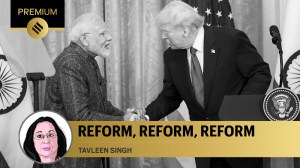Gujarat saw 4-fold rise in incidents promoting enmity in 2022: NCRB
The police attributed the rise to the state government's decision to bring charges of "faking news spread via social media and other platforms" under Section 153A (promoting enmity between different groups on grounds of religion, race, place of birth, residence, language, etc).
 In 2018, the state government made fake news spread via social media or any other channel/medium, provocative speeches etc, punishable under IPC section 153. (Express File Photo)
In 2018, the state government made fake news spread via social media or any other channel/medium, provocative speeches etc, punishable under IPC section 153. (Express File Photo)Gujarat saw nearly a four-fold rise in incidents “promoting enmity between different groups” in a span of a year in 2022, reveals data by the National Crime Records Bureau (NCRB). According to the NCRB report for 2022 released Sunday, 45 such incidents were registered in 2022 as against only 12 in 2021.
In addition, 40 cases under IPC section 153A and 153AA for promoting enmity between different groups were reported in 2022, compared to 11 in 2021.
The police attributed the rise to the state government’s decision to bring charges of “faking news spread via social media and other platforms” under Section 153A (promoting enmity between different groups on grounds of religion, race, place of birth, residence, language, etc).
At the same time, the NCRB data shows incidents of circulation of fake news or rumours saw a drop in Gujarat in 2022. Notably, such incidents have been reported under IPC Section 505 (statements conducing to public mischief) along with provisions under the Information Technology (IT) Act in the NCRB data.
In 2021, Gujarat reported 11 such incidents, while in 2022, it came down to four. The year also saw more rioting incidents — from 161 in 2021 to 172, including nine that were communal or religious in nature, in 2022. In 2021, only three riot cases were reported to be religious or communal.
Gujarat DGP (law and order) Shamsher Singh attributed the uptick in such offences to social media posts. “Social media is widespread now and one aspect is we use IPC Section 153A for, say posts with fake/morphed content.
Depending on the content, we see if IPC section 153A or 505 is applied,” Singh explained.
In 2018, the state government made fake news spread via social media or any other channel/medium, provocative speeches etc, punishable under IPC section 153. He added that during his tenure as Vadodara city police commissioner, there were instances when cases were registered under IPC section 153A for circulation of alleged fake social media posts.
In June 2022, for example, a leader of the Socialist Democratic Party of India (SDPI) in Navsari was arrested under IPC sections 153A and 505, along with other offences under the Information Technology Act, for allegedly circulating fake messages on WhatsApp. The same month, Jaipur resident Sanjay Garg, a social activist and vice-president of the Swatantra Bharat Party, was arrested by the Gandhinagar police for his comments on Prime Minister Narendra Modi and Uttar Pradesh Chief Minister Yogi Adityanath published in an e-newspaper called Padkar News.
The year also saw Surat police arrest five persons for sticking posters of then BJP national spokesperson Nupur Sharma on the main road and circulating videos of it on social media.
In April this year, a Vadodara Special Investigation Team arrested a man for allegedly circulating morphed videos of hate speech by Vishwa Hindu Parishad (VHP) leaders and clips of unrelated incident of rioting on social media after a stone-pelting incident during the Ram Navami procession in Vadodara in March. The accused was booked under both IPC sections 153A and 505.












